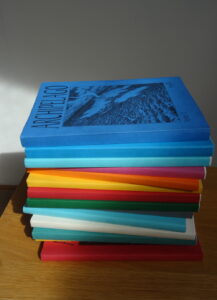Sue Brooks delights in the latest issue of Clutag Press’s occasional magazine, Archipelago.

I have never been a collector. My bookshelves are a chaotic muddle, with only one exception — a complete set of Archipelago magazine. Twelve copies from 2007 – 2019.
When the anthology Archipelago: a Reader was published in 2019, it seemed as though the Editor’s lament for ‘The Good Ship’ in Number 12 was heartfelt and true. I mourned the loss. There could never, absolutely never, be a Number 13. But serendipity intervened and I discovered there had been a hiatus during the pandemic, and Archipelago had taken to the seas again in Spring 2022. And now, in 2023, a new publication — Archipelago Number 2:2.
Familiar names appear among the crew and many new female members; the same skipper; the same taste for high adventure and a passion for ‘the margins of the unnameable constellation of islands on the eastern Atlantic coast.’ There is brilliant writing here. About longing and belonging, about letting places tell their own story. David Gange’s ‘Archive of the Oar’ is the first. A year off from his desk job as a historian to explore the cultures of coastal communities by kayak. People whose lives were built around small boats. It is followed by Sally Huband’s fascination with ‘noosts’: the hollows dug at the top of beaches and sheltered bays in Shetland, where small boats could rest out of the reach of high tides. It’s a straightforward tale, understated, leaving an imprint of her marvellous discoveries, reminiscent of Kathleen Jamie, or Julia Blackburn, but uniquely her own.
Fraser Macdonald revisits his father’s family home at Abriachan above Loch Ness. Is there any part of him which could be said to belong there, in this group of three crofts high on the hill called Achbuie? Jessie Kenton, radio playwright and friend of Nan Shepherd, lived at No. 3 in the 1930s. (She is one of the Wanderers in Kerri Andrews’s book A history of women walkers.) The juxtaposition of these pieces early in the voyage is very powerful, and continues with ‘Ben Dorain’, Kirsty Gunn’s paean to the mountain and the poem by Duncan Ban MacIntyre, published in 1768. To my mind this is the pièce de résistance of Number 2:2. I thrilled to it.
Knowing nothing of cantaireachd (singing in Gaelic) or of piobaireachd (the most sophisticated form of Highland Bagpipe music), I listened to her words. I sensed how, over a long summer, she began to conjure the lost music into life. She questions her father. Could it be like this, or perhaps like this..? There is a silence and he starts to sing — ‘my father’s voice carries the call of it in the clustering notes of his tune, in the yearning of the voice to settle on the long breve, wanting to arrive there on that A.’ And in some quite magical way, I fancy I hear it too. To create music through the subtle patterning of words on a page is a marvel I have never experienced before. Thank you Kirsty.
There is a change of tone — a shift in the wind that needs a tack or two? Three in fact, as eminent writers turn their attention to the ‘States Of The Nations’. Patrick McGuiness on Wales, Alan Riach on Scotland and Gerald Dawe on Ireland. Each one uniquely personal and heartfelt. Who knows about England…? Perhaps we will find out in Archipelago 2:3.
Characteristic of the skipper — who loves to surprise — the voyage ends at a railway station. Pamela Clemit’s childhood memories in the elegant Station Master’s house at Chathill on the East Coast Main Line. How wonderful it was, the friendliness of the people, the sounds and smells of the coal, the Christmases in the 1960s. It is now part of the fully electrified Northern Trains East Coast Line, the buildings Grade I listed as holiday homes. She hasn’t been back since her mother’s funeral in 1989. In the Notes on Contributors, Pamela is described as a ‘writer on the edge’. I loved that and reflected that it is true of every single writer in this outstanding collection. Has it made a difference that two thirds of the crew are female..? I feel it does, but as yet beyond definition — I invite you to make up your own mind.
*
Copies of Archipelago are available here.